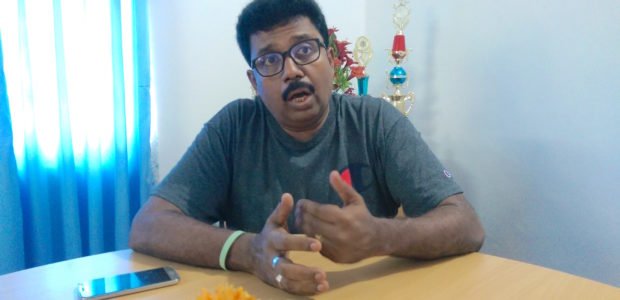THARMINI PATHMANATHAN
Since last year, the Jaffna Social Action Center has been conducting meetings and running programmes with religious leaders to create a sense of inter-ethnic harmony. Nadaraja Sukirtharaj, the Centre’s Coordinator raised this question during a special interview with The Catamaran recently: “No politician can speak for the Tamil people. They wish a tumultuous situation prevails in the country in order to deceive people and garner votes. They do nothing for the development of the economy and the country. Neither do they know how to comment on a subject, opting to just talk politics instead of racial issues. Has anyone said they will achieve a development target or give us a deadline as to when they would?”
The Catamaran: The government came into power with a platform of reconciliation but failed to prevent the April 21 incident. Since the attacks, there has been much indirect pressure on the Tamil people. In this context, how do you carry out reconciliation activities?
Sukirtharaj: Reconciliation is spoken of in all countries. It is necessary when a group, religion, race or family at odds to resolve contradictions. As an officer working for peace and reconciliation, what we present is ‘reconciliation between the public’. When politicians, the government, the president or the parliamentarians act in harmony, they mostly have their own political agendas in mind. But this is not how they bring about harmony in the country. Only about 10% of the population are allies of politicians and political parties. Therefore, our organization has the hope that public reconciliation can be achieved. Reconciliation must occur naturally and cannot be brought about legally, politically or artificially. If you want to connect with people, you have to look at it from several angles.
The Catamaran: How can we successfully face challenges to the reconciliation process?
Sukhradaraj: Reconciliation with people without addressing issues is a huge challenge. Why do Tamils in the North and East get upset? What upsets the people in the South? These are questions that should be discussed by the people of both North and South. A conflict situation prevailed between Sinhalese and Tamils earlier. Now it has become a conflict between three communities – Sinhala, Tamil and Muslim. The biggest challenge right now is how the communication system works between the three ethnic groups. It is confined to politicians and the media associated with them. It must be opened to the public.
The Catamaran: Politicians are also elected representatives of the people. So, shouldn’t they be seen as the voice of the people?
Sukhradaraj: Yes, it is true. Politicians, however, often look forward to their own interest aiming at power and positions. The know how to distort news in order to sideline someone they do not like and promote a group which they favor. They create conflict. Thus, the people of the South do not even know whether the information conveyed to them about the position of the Tamil party is true or false. This is why we must have direct communications with the public. People should join hands, regardless of majority or minority. The government will be compelled to listen. That is the strength of the people.
The Catamaran: Can you tell us about the interreligious dialogues you have conducted?
Sukirtharaj: Our group is the Center for Truth and Reconciliation and we have held these discussions since 2018. When the Office for Missing Persons opened in Jaffna, we came together to raise public awareness about it. We discussed what can be done in relation to the thoughts of the people, divisions among them, and angles in which people think. We also examined the intermingling of religious representatives and social activists to bring about reconciliation between all religions and ‘Preventing Recurrence’ as per Clause 6 of the Transitional Justice Protocol.
After the Easter Sunday attacks we organized two lectures and asked Religious leaders and people’s representatives to speak at these sessions. Everyone expressed a sense of dissatisfaction and apprehension. We also wrote to the Governor of the Northern Province, through UNICEF, requesting a discussion with the authorities about security check-points in schools. In addition, we have meetings and consultations on projects for co-existence.
The Catamaran: The public alleged that youngsters have no interest in harmony and they are hard-hearted. This has been cited as the reason for continuing violence in Puttalam and up-country areas.
Sukirtharaj: You cannot say that young people are not interested in harmony. We have to see why they behave like that. The experience and guidance determine their actions. Those who are with violent mental conditions can be transformed into social-minded people. It is the feelings or experiences they get through other relationships that make changes in their mindset. We should not see just one side of the page.
As for the North, many of these young people are in a state of despair. They were born during a time of crisis and spent their childhood in a country at war. Opportunities are being denied to them and they have no proper guidance. There are no suitable career opportunities.
Some politicians take advantage of situations like this and seek to misguide them. No ministry has plans to change their mindset, nor does the government have plans to give hope to the youth of this country. This is why many seek education and employment overseas.
Elderly people, including politicians who are over the age of 75 represent young people. Look at so-called youth organizations where elderly people function as leaders until their death. Young people should be given opportunities and some decision making social responsibilities. Only then will violent thoughts be removed from their thinking.
This article was originally published on the catamaran.com









